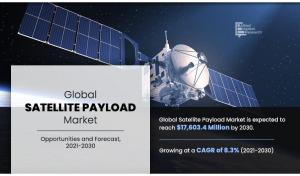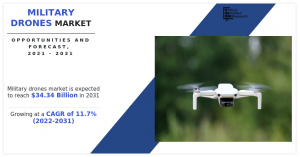
Satellite payload Market will Exceed US $17.60 billion by 2030, with a projected CAGR of 8.3% from 2021 to 2030
By payload type, the communication segment is anticipated to exhibit significant growth in the near future.
WILMINGTON, DE, UNITED STATES, December 23, 2024 /EINPresswire.com/ — The global satellite payload market was valued at $8.21 billion in 2020, and is projected to reach $17.60 billion by 2030, registering a CAGR of 8.3% from 2021 to 2030.
Request The Sample PDF Of This Report: https://www.alliedmarketresearch.com/request-sample/3098
North America leads the market in terms of revenue, followed by Asia-Pacific, Europe, and LAMEA. The satellite payload market has strengthened in North America due to the growth in telecommunication, navigation, and surveillance applications. Government and military organizations are using satellite imaging for mapping, military reconnaissance, disaster management, and others. The increasing number of terrorist attacks and natural disasters, along with growing requirement for communication of sensitive information in such situations has increased the adoption of satellite payload. In 2020, the U.S. led the global satellite payload market share, and this trend is expected to continue during the forecast period.
Modern communication payload is being designed to offer high data throughput systems, ultra-low jitter clocking solutions, and highly integrated point-of-load (POL) solutions to reduce overall board size. The adoption of photonics, laser-based and optical technologies has increased in the recent years for data transmission. Laser based technologies offer advantages such as greater security, reduced interference to space signals, higher speed, and superior accuracy over traditional radiofrequency (RF) technique.
Based on orbit type, the satellite payload market is segregated into LEO, MEO, and GEO. In 2020, the LEO orbit segment dominated the market, owing to opportunities such as technological advancements, and growth in public sector funding. Evolution of Internet of Things (IOT), growth in commercial applications, and greater demand from the defense sector is expected to accelerate this growth. Increased adoption of wireless technologies, advanced motion & temperature sensors, high precision cameras, and others is expected to supplement the market growth. In addition, advancements in data transmission capability, improvement in geospatial processing, and scalability of cloud-based platforms to provide satellite imagery are expected to provide lucrative opportunities in the near future.
LIMITED-TIME OFFER – Buy Now & Get Exclusive Discount on this Report @ https://www.alliedmarketresearch.com/checkout-final/371e553287cfb723120e376d6655c045
The significant factors impacting the growth of the satellite payload market include increase in adoption of small satellites, and greater use of satellite payload in commercial applications. Furthermore, growth in demand from the defense sector, and technological advancements associated with satellite payload are expected to drive the market growth. Moreover, greater concerns regarding space debris, and stringent government regulations associated with satellite launch hinder the market growth. Growing adoption of satellite constellation, and rising investment by government and research organizations for satellite advancement are expected to offer growth opportunities during the forecast period.
COVID-19 Impact Analysis
The COVID-19 crisis has created uncertainty in the market, massive slowing of supply chain, falling business confidence, and increasing panic among the customer segments. Governments of different regions have already announced total lockdown and temporary shutdown of industries, thereby adversely affecting the overall production and sales.
The impact of the COVID-19 pandemic has resulted in delayed development and launches of satellite payloads and launching vehicles, slowdown in the operation of the key players, and shortage of components. The satellite launch services and satellite manufacturing has also been impacted by computer chip shortage, due to manufacturing shutdowns in China, South Korea and Taiwan. The limited chip supplies caused SpaceX to delay the development of a new user terminal for its Starlink satellite broadband system.
The pandemic has caused delays in development of several projects. The Defense Advanced Research Project Agency’s Blackjack program, which is aimed at demonstrating a new communications network for the military in low-Earth orbit, was scheduled to be launched in 2022. The launch is expected to be delayed due to shortages of microchips and other electronic components.
Inquiry Before Buying @ https://www.alliedmarketresearch.com/purchase-enquiry/3098
Key Findings Of The Study
By payload type, the communication segment is anticipated to exhibit significant growth in the near future.
By orbit type, the LEO segment is expected to register a significant growth during the forecast period.
By vehicle type, the small vehicle segment is anticipated to exhibit significant growth in the near future.
By payload weight, the high weight segment is anticipated to exhibit significant growth in the near future.
By frequency band, the VHF and UHF segment is anticipated to exhibit significant growth in the near future.
By application, the remote sensing segment is anticipated to exhibit significant growth in the near future.
By region, Asia-Pacific is anticipated to register the highest CAGR during the forecast period.
Key players operating in the global satellite payload market include Airbus SE, The Boeing Company, Honeywell International Inc., Intelsat S.A., Lockheed Martin Corporation, Mitsubishi Electric Corporation, Northrop Grumman Corporation, Raytheon Technologies Corporation, Thales Group, and Viasat, Inc.
Related Reports:
Aerospace Adhesives Market https://www.alliedmarketresearch.com/aerospace-adhesives-market
Aircraft Electrical System Market https://www.alliedmarketresearch.com/aircraft-electrical-system-market-A06200
Aircraft Sensors Market https://www.alliedmarketresearch.com/aircraft-sensors-market-A06225
David Correa
Allied Market Research
+1 800-792-5285
email us here
Visit us on social media:
Facebook
X
Legal Disclaimer:
EIN Presswire provides this news content “as is” without warranty of any kind. We do not accept any responsibility or liability
for the accuracy, content, images, videos, licenses, completeness, legality, or reliability of the information contained in this
article. If you have any complaints or copyright issues related to this article, kindly contact the author above.
![]()
Originally published at https://www.einpresswire.com/article/771348997/satellite-payload-market-will-exceed-us-17-60-billion-by-2030-with-a-projected-cagr-of-8-3-from-2021-to-2030


